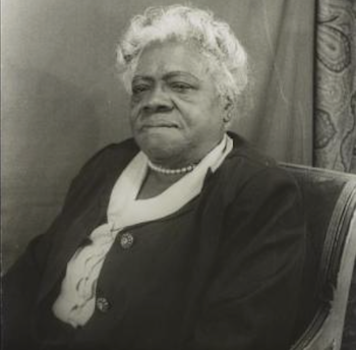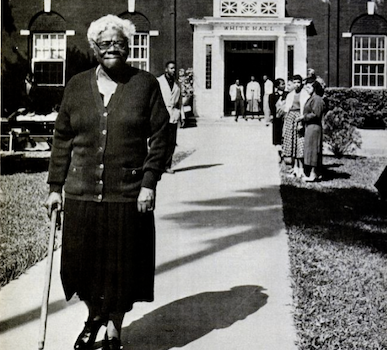
Mary McLeod Bethune was born on July 10, 1875, in Maysville, South Carolina to Samuel McLeod and Patsu McIntosh. Her parents and her oldest siblings were enslaved prior to emancipation. Despite being free, her parents were still inclined to work for their previous owners as sharecroppers to earn an income. However, they faced these hardships by embracing familial unity and sincerely adhered to the Christian faith. Even though she was the fifteenth born of seventeen children, Bethune had the opportunity to receive an education. This opportunity was especially an uncommon trend following the Civil War. Specifically, her parents were especially encouraging as they wanted their inquisitive daughter to thrive in her schooling. At age 10, Bethune was delighted to attend the newly opened Maysville Presbyterian Mission school. She believed that this unique educational opportunity would allow her and her family to escape a life of bondage and poverty. In addition, Bethune viewed this as evidence that God had given her a specific purpose for her life. Due to her impressive knowledge, a Quaker school teacher offered to finance her education at Scotia Seminary. The school was a female seminary school for African-American women, focusing on preparing the mind, spirit, and body. Bethune was prominently involved as she was the president of the student literary society and led the debate team. After graduating in 1894, she attended Moddy Bible Institute as the only African American among seven to eight hundred students. During her time, she interpreted the Institute as an area of racial harmony and viewed a Chrisitan understanding as the possible solution for racial issues.
Following her educational journey, Bethune initially planned on becoming a missionary in Africa. Unfortunately, none of the Churches were willing to sponsor her. These rejections led her to pursue an educator role instead at multiple schools, including Haines Institute in Augusta Georgia. She met and married Albertus Bethune in 1898 and eventually moved to Palatka, Florida where she worked in a Presbyterian missionary school. They had one son, Albert McLeod Bethune, Sr. They would unfortunately separate in 1907 when Albertus abandoned the family, yet they never officially divorced.
Bethune later moved to Daytona Beach Florida, marking her first major establishment. Bethune’s belief in the necessity of education urged her to open the Daytona Literary and Industrial Training Institute for Negro Girls on October 3, 1904. However, it eventually merged with the all-male Cookman Institute of Jacksonville, Florida in 1923 and became accredited in 1931. Furthermore, it remains an accredited university today under the name Bethune-Cookman University. Bethune became the first African-American woman to hold a position as a college president.
During this time, Bethune also started entering the activist realm. Specifically, she had her start at the state level in Daytona as she fought against segregated education, low healthcare quality for African-American patients, and advancing gender equality by assisting women with filling ballots. Her influential activism expanded as she became the eighth president of the National Association of Colored Women (NACW) in 1924. She wanted to create an “umbrella organization” that focused solely on establishing women as the main advocates for change. This passion led to the creation of the National Council of Negro Women, where Bethune was unanimously voted as President and fostered a community of 850,000 members. Her immense knowledge and leadership were highly admirable, which landed her the vice president role in both the National Association for the Advancement of Colored People (NAACP) and the National Urban League.
Bethune’s impressive activism eventually landed her highly influential political positions. For example, she became an advisor to President Calvin Coolidge and Herbert Hoover where she advised on topics regarding youth employment and education. In 1935, she was called by President Franklin D. Roosevelt to serve as a Special Advisory to the National Youth Administration. Bethune was also part of the “Black Cabinet'' , which was a group of African- American policy advisors to President Roosevelt. They were successful as they increased opportunities for African Americans during the New Deal era. Roosevelt was in awe of her talents, leading him to create a new Department - the Division of Negro Affairs- for her to lead. This appointment made her the first African-American woman to head a federal agency. Bethune even advised President Truman to include African American women in the Women’s Auxiliary Army Corps (WAACS) and Women Appointed for Voluntary Emergency Services (WAVES) during World War 2. Around this time, Bethune also received honorary degrees from eleven different universities. Some of these universities include Howard University, Benedict College, Rollins College, and Atlanta University.

Despite Bethune’s various extraordinary roles, her influence ventured even further. She was also a writer and contributed to publications in NACW’s National Notes, the National Urban League’s Opportunity, Women United (previously known as NCNW’s Aframerican Woman’s Journal), and many more. In addition, she owned numerous real estate in Florida and invested in life insurance companies. Bethune was also a public advocate for the preservation of African American History. Once again, she became a commandeer as she became the first female president of what is now known as the Association for the Study of African American Life and History.
After her retirement as an advisor and from the NCNW president role, she passed away due to heat failure in her Daytona home on May 18, 1955. She was buried in her cherished campus and her home became the Mary McLeod Bethune Foundation National Historical Landmark. Despite her death, her legacy and impact transcends her period. In 1973, she was inducted into the National Women’s Hall of Fame. Bethune was also issued a stamp in her honor by the US postal service, making her the second African-American woman to be featured on a stamp.Finally, a statue was commemorated in the Statuary Hall in Washington DC as the representative of the State of Florida.
As stated in her last will, Bethune expressed “If I have a legacy to leave my people, it is my philosophy of living and serving”. With her countless positions and establishments, her quote is accurate as her legacy is truly everlasting. Despite being the first woman or African-American in her respective positions, she paved the pathway for future individuals to follow in her steps. Through her creation of various institutions aimed at women, she is still currently giving hope to many young women across the United States. Bethune’s story teaches that rather than succumbing to a society-installed hurdle, one must find a way to establish a new opportunity that combats these obstacles. As a young African-American woman existing in an era of the United States that was fueled by racism and misogyny, Bethune remained victorious.
Why Did I Choose to Research Mary McLeod Bethune?
Even though we like to imagine that racial and gender inequality are significantly lower today, they are still highly prominent. During one of my classes, I learned about intersectionality theory and I grew vastly interested in it. During personal research, I came across her story and was fascinated. I can not imagine the hurdles Bethune must have faced due to her identity as an African American woman. She had to fight for both racial and gender equality, while she may have not been accepted by some of the other non-African American women fighting for gender equality. This makes her even more admirable in my eyes. Despite her respective realms being mainly white and male dominated, Bethune was never discouraged. Her story inspires me to keep pursuing all of my passions and dreams, even if it means becoming the “first” in the field.
Works Cited
Dr. Bethune’s Last Will & Testament. (n.d.). Bethune-Cookman University. Retrieved from https://www.cookman.edu/history/last-will-testament.html
Michals, D. (2015). Mary McLeod Bethune. National Women’s History Museum. Retrieved from https://www.womenshistory.org/education-resources/biographies/mary-mcleod-bethune
Miller, B. (n.d.). Mary McLeod Bethune. Biola University. https://www.biola.edu/talbot/ce20/database/mary-mcleod-bethune
National Park Service. (2024, May 29). Mary McLeod Bethune. Retrieved from https://www.nps.gov/mamc/learn/historyculture/mary-mcleod-bethune.htm
The National WWII Museum New Orleans. (2020, July 30). The Extraordinary Life of Mary McLeod Bethune. https://www.nationalww2museum.org/war/articles/mary-mcleod-bethune
This article was published on 10/9/24